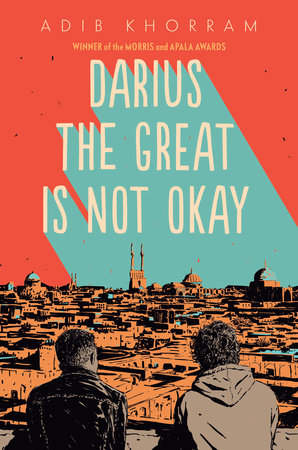Adib Khorram on Writing Honestly About Mental Health, Love, and Iran
by Jessica Mizzi and admin
“I studied her hands. I had never really seen my grandmother’s hands before. She squeezed and squeezed me, like she was worried I would blow out the window if she didn’t hold tight enough. Maybe she was trying to fit a lifetime of missed hugs into the one car ride. Maybe she was.”
— Adib Khorram, Darius the Great Is Not Okay
Adib Khorram’s debut, Darius the Great Is Not Okay, is a beautiful novel about a half-Persian teen whose world changes when he travels to Iran to meet his grandparents for the first time. Darius, or Darioush, depending on the day, suffers from clinical depression, subpar social skills, and self-esteem issues, making him an all-too-relatable character for anyone who has ever felt like an outsider in their own space. Darius’s story also captures what it can feel like to be biracial and a child of an immigrant, split between the world you know and the world that your family comes from — the one you want to know better.
I had the opportunity to chat with Adib about his inspiration for his book, the importance of representation in literature, and more.
Iran comes alive in the pages of your book. Have you traveled there? Can you offer any tips on making a setting seem authentic in fiction?
I wish! But sadly, I’ve never been. There are a lot of complicated factors that go into visiting Iran as an American citizen, and they’re compounded if you’re of Iranian extraction, and even more compounded for my family since they’re Bahá’í. But I guess I always have my fingers crossed for things to improve and that I’ll get to go someday.
As far as making a setting authentic: research, research, research! I had family stories and photos, books and articles on Iran and Yazd as they currently are (my family left in the ’80s so I needed more recent accounts), more photos from my family who still lives in Iran, and Google Street View.
Is it important for writers to insert themselves into their characters? What value does this add to a story?
My personal opinion is that it’s impossible not to put pieces of yourself into what you write. What’s been most fascinating to me is to go back and see all the ways I subconsciously did so.
I think readers can pick up on when a writer is being honest with them, and that’s what makes a book resonate: when they see the character experiencing something or feeling something that they went through as well.
How did you go about building the relationships in your book, particularly the friendship between Darius and Sohrab? Why did you choose to write about Darius’s feelings towards Sohrab in the way that you did?
I wish I knew! My process tends to be haphazard and organic. Imagination? Memory? I think if you develop the character well enough, their relationships tend to form through simple gravity.
One thing I did deliberately try to include, though, was a different version of masculine affection. Cultures in Southwest Asia have different rules for expressing platonic affection physically, and I wanted to capture that — as well as Darius’s confusion on experiencing it for the first time, and trying to reconcile it with his own feelings about how boys can or should relate to each other.
A lot of readers have asked whether Darius is gay or not. I have complicated feelings about answering that question directly, because I feel like what’s on the page is on the page, and that books belong to the reader. But for me personally, yes, I wrote Darius as someone who was questioning, and with the idea that he would eventually — past the end of the novel — grow to identify as gay. So that adds yet another layer to his trying to understand the new rules for boys in Iran.
But Darius is and always has been about all kinds of non-romantic love. It was important to me to show that the love between friends can change your world every bit as much as romantic love can.
Do you think there has been a rise in literature that normalizes mental illness? How can we continue to improve on this?
I do think so. At first it seemed like there was a surge in books about suicide, but lately there have been books that look at mental illness as a part of a person rather than a crisis. Chimamanda Ngozi Adichie speaks eloquently about the dangers of a single story. For a long time, suicide was the single story for mental illness, but we’re finally seeing multiple stories, and I’m hopeful that trajectory will continue.
As a child of immigrants who hasn’t seen her grandparents in ten years, I was deeply moved by Darius’s story. What is one thing you’d like children of immigrants to know as they grow older and face the world?
I grew up with super complicated feelings about being a child of the diaspora, and I’m still grappling with them. I hope other kids growing up in the diaspora will see that it’s okay not to have things figured out right now, or ever.
What do you hope that readers take away from Darius the Great Is Not Okay?
I hope non-Iranian readers will come away with an understanding of the humanity of Iranians. So much of the news coming out of Iran these days, especially what’s filtered through American media, tends to vilify them.
And I hope Iranian readers come away with a little warmth in their heart from seeing themselves on the page.
-
Get the Book:

